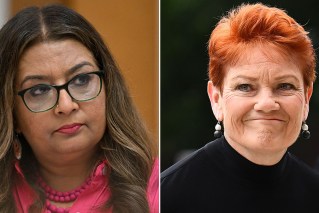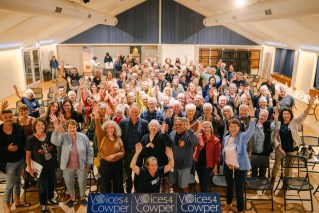‘Make history’, PM urges voters after historic Voice step

Prime Minister Anthony Albanese has urged Australians to “make history” after legislation to enable a referendum on the Indigenous Voice passed the senate.
The Senate passed laws on Monday to enable the referendum 52 to 19, following a fiery final debate in the upper house.
The vote means Australians will vote in the referendum, the first in more than two decades, in the next two to six months. The government has already flagged it will take place between October and December.
Monday’s vote – which ended months of parliamentary procedure – drew a standing ovation in the public gallery and rounds of applause.
In the minutes after, Mr Albanese said Australians would now be able to have their say.
“I say to my fellow Australians, parliaments pass laws but it is people that make history,” he said.
“This is your time, your chance, your opportunity to be part of making history.
“It will be a moment of national unity, a chance to make our nation even greater.”
Despite recent polls showing support for the Voice falling across the country, Mr Albanese said he had “faith in the Australian people”, and that it would pass.
“I am very confident that a positive campaign will produce a positive result, and will produce something that we can be proud of,” he said.
Labor senator Murray Watt said the significance of the day was as “big as Uluru” – a view endorsed by Assistant Indigenous Australians Minister Malarndirri McCarthy.
“[Indigenous people] want this to happen,” she said.
“They’re reaching out to all Australians, to be able to feel proud of this time in our country’s history where we can lift one another up.
“It is the systemic change that was called upon by those who gathered at Uluru.”

Penny Wong embraces Malarndirri McCarthy after the passing of the legislation on Monday. Photo: AAP
While most Coalition senators spoke against the Indigenous voice, most voted to set up the referendum to allow the public to have their say.
Liberal senator Michaelia Cash voted for the bill, but described the Voice as “risky, unknown and divisive”.
Opposition Indigenous Australians spokeswoman Jacinta Nampijinpa Price said the Voice was dividing Australians.
“The goodwill of many non-Indigenous Australians is being exploited by those who seek to profit in money, clout or power off the real problems being faced by marginalised Australians,” she said.
Independent senator Lidia Thorpe said it would be tokenistic and wouldn’t address issues affecting Indigenous people. She instead urged the government to set up a treaty, calling the Voice a powerless body that was about little more than “appeasing white guilt”.
“Happy assimilation day, everybody,” Senator Thorpe said.
“Many clans and nations around this country do not support assimilating into such a racist, colonial regime and we will continue to push for our sovereignty to be acknowledged.”
Upon the bill passing, she yelled out “another day in the colony, another nail in the coffin”.

Independent senator Lidia Thorpe spoke against the legislation. Photo: AAP
Uluru Dialogue co-chair Megan Davis said the bill passing was an historic moment.
“We’re closer to a referendum to finally give First Nations Peoples a chance to be heard,” Professor Davis said.
“This is the recognition we’ve been fighting for and what the vast majority of First Nations People support.
“The significance of this moment cannot be overstated.”
Paul Ramsay Foundation chief First Nations officer Michelle Steele, who travelled to parliament for the vote, said there was a feeling of excitement and optimism among ‘yes’ campaigners.
“I want to say to broader Australia, please just listen to us and that’s the most important thing about the voice,” she said.
“Some details might come later but it is really a great opportunity for us to share this love of country.”
Some senators were designated to vote against the bill. That is procedural and will allow them to outline arguments for a ‘no’ vote in pamphlets, which will be sent to all Australian households.
Among those who voted ‘no’ in the chamber were Senator Price, Nationals senator Bridget McKenzie and Senator Thorpe.
Liberal MP Julian Leeser, who stood down from the party’s front bench due to his support for the Voice, said a ‘yes’ vote would lead to real change.
“The Voice is a practical change that will help local and regional communities across Australia,” he said.
“It is a safe constitutional change and it will make a meaningful difference to the lives of Aboriginal and Torres Strait islander Australians.”‘
Shortly after the legislation passed, Mr Leeser appeared at a media briefing with other Liberals for Yes members, including Tasmanian MP Bridget Archer.
– with AAP








